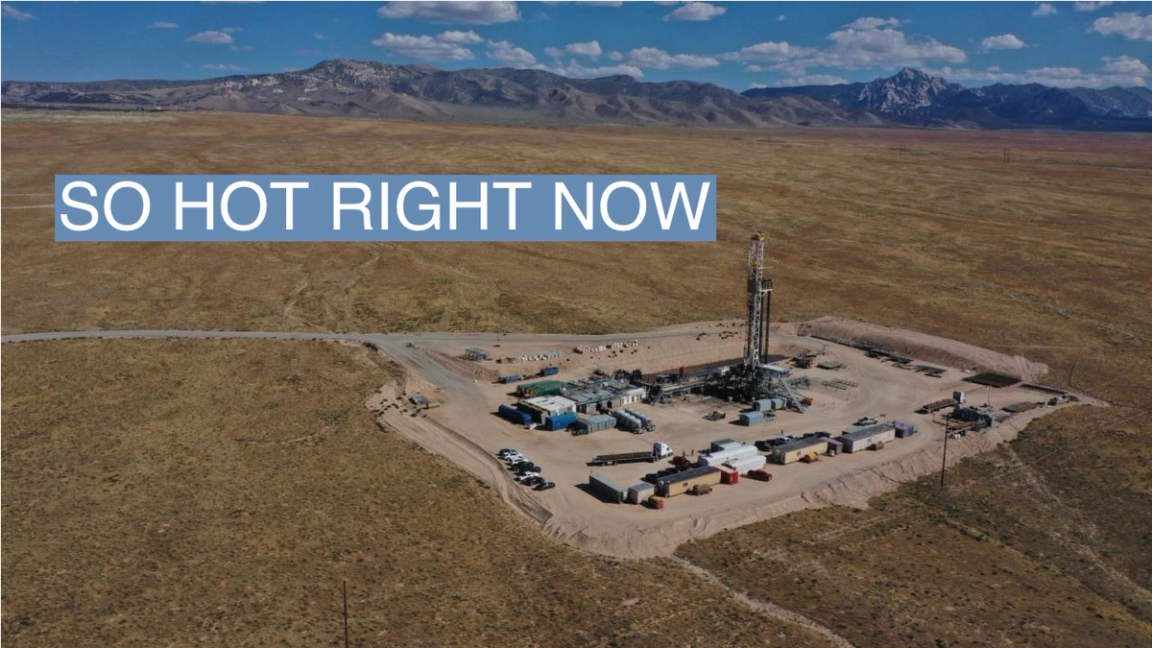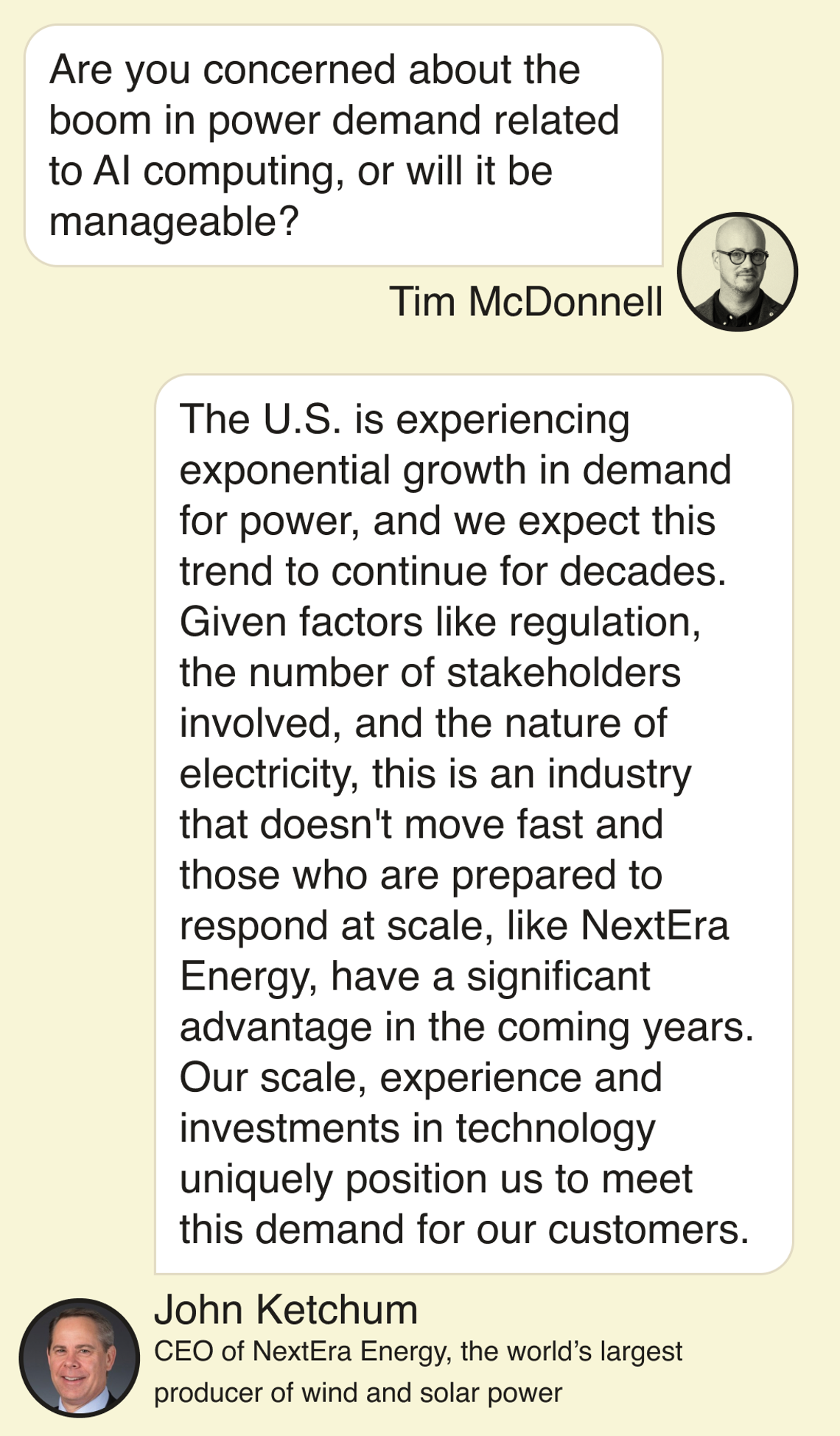| | The latest edition, written from the CeraWeek energy conference in Houston, features a look at U.S. ͏ ͏ ͏ ͏ ͏ ͏ |
 - Who wants hydrogen?
- Death to diesel
- Deep sea mining talks
- Refinery strike
- Cheap heat
 Navigating the AI electricity boom, and an intriguing solution for banks’ emissions. |
|
No one wants to buy hydrogen |
| |  | Tim McDonnell |
| |
 Darren Woods, the chairman and CEO of Exxon Mobil Corporation. REUTERS/Callaghan O'Hare Darren Woods, the chairman and CEO of Exxon Mobil Corporation. REUTERS/Callaghan O'HareThe Biden administration is developing a plan to subsidize the purchase of low-carbon hydrogen, in response to complaints from early investors that existing subsidies for its production aren’t enough to make it attractive to buyers. Hydrogen’s demand dilemma is a hot topic at the CERAWeek energy conference in Houston this week. In an interview with Semafor on Monday, former Energy Secretary Ernest Moniz said the nonprofit he now leads, the Energy Futures Initiative, is collaborating with the Department of Energy on how to fix the problem within the existing federal budget, and expects to have a plan in place by fall. “Demand formation is a real challenge,” he said. “To step up the market in a short time, we have to manage and diminish some of the financial risks so that companies can make off-take commitments.” In a panel discussion on the effort, David Crane, the Department of Energy’s under-secretary for infrastructure, was more succinct: “There are a lot more people interested in going second than in going first on buying clean hydrogen.” The situation with hydrogen is emblematic of a broader problem that oil executives at CERAWeek are blaming for the slow pace of the energy transition: Government officials, some shareholders, and activists all want oil and gas companies to offer more low-carbon products, except the one constituency that really matters — Big Oil’s customers. |
|
| |  | Prashant Rao |
| |
 Courtesy Mainspring Courtesy MainspringThe French company Schneider Electric has reached a partnership with a power-generation startup aimed at displacing diesel generators across the United States. Schneider will deploy Mainspring Energy’s “linear generator” across renewables-powered microgrids to provide baseload power. The linear generator is a new type of device that can turn different fuels into electricity by using twin cylinders to compress fuel and air in order to break down the fuel molecules and push the cylinders back out, generating power. Unlike conventional generators, Mainspring’s device can take those different fuels without hardware changes, meaning the linear generator can shift from natural gas to hydrogen and ammonia over time as the latter becomes more available. Even when it uses natural gas, the company’s co-founder and chief executive Shannon Miller said in an interview, it emits fewer emissions than regular gas-powered generators. Mainspring — which has received funding from Khosla Ventures, Shell Ventures, and Bill Gates — is not yet profitable, Miller acknowledged, and is “focused on ramping, focused on scaling” for now. It expects to see linear generators powering hundreds of megawatts of electricity next year, from tens of megawatts this year, she added. |
|
 Courtesy The Metals Company Courtesy The Metals CompanyNegotiators resumed talks on rules governing deep sea mining this week, with U.S. officials increasingly viewing the practice as an alternative source of critical minerals to reduce dependence on China. The talks — run by a small U.N. agency called the International Seabed Authority — have thus far failed to result in an agreement over whether, and how, to carry out deep sea mining, which activists argue could disrupt fragile marine ecosystems. Despite the concerns, many countries, from giants like the U.S. to minnows such as Nauru, argue it will be necessary to supplement minerals supplies to fuel the energy transition. Lobbyists in Washington who have largely failed to get the issue on Capitol Hill’s radar have pointed to deep sea mining’s potential for alleviating global reliance on China for minerals supplies and processing: Two Republicans in the House of Representatives last week introduced a bill pushing for deep sea mining to be better financed, while dozens of Republican lawmakers have written to Defense Secretary Lloyd Austin advocating for the practice. “Switching the messaging to defense has spurred interest in the field,” The Wall Street Journal noted. |
|
 Barrels per day of Russian crude oil refining capacity taken offline by Ukrainian drone strikes over the weekend, according to a JPMorgan estimate. Combined with Western sanctions on Russian crude oil exports, the strikes leave more of Russia’s oil trapped within the country, which is damaging to the Kremlin’s fossil fuel revenues but are driving up prices globally. “I suspect the U.S. is not thrilled about these attacks,” Ben Luckock, head of oil at commodity trader Trafigura, said during a CERAWeek panel, since they effectively bypass the sanctions regime. |
|
 Courtesy Fervo Energy Courtesy Fervo EnergyGeothermal energy can be made cost-competitive with fossil fuels for less up-front investment than most other emerging low-carbon energy technologies, a Department of Energy report found. If startups and government agencies invest about $25 billion in building out the first generation of advanced geothermal systems, the average cost of power they produce can fall from more than $100 per megawatt-hour today to less than $70 by 2030, according to the DOE’s latest “pathways to commercial liftoff” report, a series that plots out the steps needed to commercialize various low-carbon energy technologies. That price would make it attractive for utilities, data centers, and other big power consumers as a source of electricity that has all the climate benefits of wind and solar but without the intermittency, and at much lower cost than nuclear. And it’s a relative bargain to develop, DOE official Jigar Shah said in an interview at CERAWeek; by comparison, getting wind and solar from inception to “bankability” required at least $200 billion in initial investment, he said. The latest geothermal tech, which borrows techniques from oil drilling, opens up large swaths of the U.S. to being tapped for subterranean heat, and is drawing the attention of investors. Leading startup Fervo Energy closed a $221 million fundraising round last month, and ExxonMobil CEO Darren Woods said this week that he’s keeping a “very close eye” on the technology for future investments. A bipartisan group of lawmakers in Congress, meanwhile, introduced legislation last week to clear away bureaucratic obstacles for geothermal, which could be a promising way to provide consistent low-carbon power for data centers. |
|
 Thanks to you all, we’ve been named to Fast Company’s 2024 list of the World’s Most Innovative Companies “for rewriting the story on international reporting.” In just sixteen months, we’ve worked to become essential to you, broken big stories, and amassed over 650,000 newsletter subscriptions across all nine of our newsletters! |
|
 New Energy- The world’s largest solar manufacturer, China’s Longi Green Energy, laid off one-third of its workforce. Solar manufacturing in China has exploded far beyond global demand, causing prices to plunge and pushing many manufacturers into dire financial straits.
- TerraPower, the advanced nuclear power company founded by Bill Gates, plans to begin construction on its first U.S. plants in June. The company’s reactors are much cheaper and smaller than traditional nuclear, but are still awaiting permits from regulators to build the most sensitive parts of the system.
Fossil Fuels- Newly-installed U.S. climate envoy John Podesta told reporters at CERAWeek that oil companies are doing well on their work to cut methane and other emissions from the operations. As for dealing with their customers’ emissions, not so much: “They’re differentiated by their general commitments to invest in clean resources beyond carbon management, with companies like Equinor having very high targets and others sort of lagging,” he said.
- The world’s biggest oil companies are expanding an effort to monitor methane leaks from oil infrastructure in developing countries. The plan is to use satellites to spot leaks, then work with the owners to plug them.
 MethaneSAT/Handout via REUTERS MethaneSAT/Handout via REUTERS- Exxon CEO Darren Woods said he’s not interested in snatching Hess away from Chevron. The two majors are in a legal dispute over Hess’s lucrative assets in Guyana, but Exxon isn’t interested in the company itself, which Chevron is in the process of acquiring for $53 billion.
Finance- A Philadelphia asset manager is pioneering a method for banks to offload their financed emissions to third-party investors. The idea is that, for a fee, large banks could cut their on-paper carbon footprint, but it’s not clear the plan would do anything to reduce real-world emissions.
Politics & Policy- U.S. regulators may push forward the date by which some coal-fired plants are forced to shut down. Draft emissions rules for the power sector originally required coal plants to cut nearly all their emissions by 2040. The latest draft moves that date to 2038.
EVs- The Biden administration is expected to announce new vehicle pollution standards today that will effectively mandate an EV boom later this decade. The rules are a key part of Biden’s climate agenda and will likely draw major pushback from automakers, Republican lawmakers, and Donald Trump.
Food & Agriculture |
|
John Ketchum, CEO of NextEra Energy, the world’s largest producer of wind and solar power.  |
|
 Sen. Michael Bennet; Sen. Ron Wyden; Kevin Scott, CTO, Microsoft; John Waldron, President & COO, Goldman Sachs; Tom Lue, General Counsel, Google DeepMind; Nicolas Kazadi, Finance Minister, DR Congo and Jeetu Patel, EVP and General Manager, Security & Collaboration, Cisco have joined the world class line-up of global economic leaders for the 2024 World Economy Summit, taking place in Washington, D.C. on April 17-18. See all speakers and sessions, and RSVP here. |
|
| |